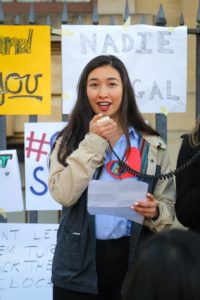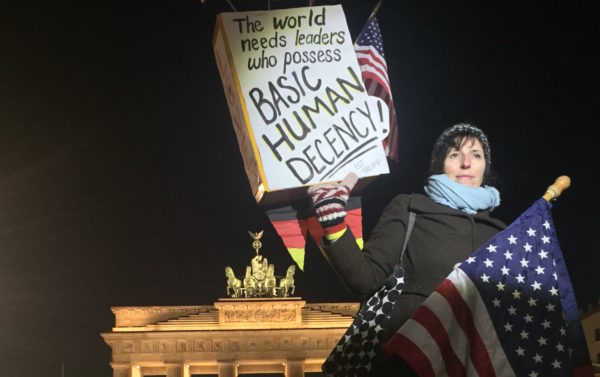On Nov. 9, 2016 at 11:41 P.M. Stanford time, the Associated Press declared Donald Trump the winner of the presidential election. On campus, it was just over 45 degrees Fahrenheit, an unusually warm temperature for the time of year. Inside dorms, tears flowed, students continued checking Twitter and PHEs told their freshmen that their doors would be open all night.
I know this not because I was on campus, but because I watched it unfold later on Snapchat. In fact, at the same moment, it was 8:41 a.m. in Berlin, and I was comfortably asleep in my bed. Like over 250 students currently enrolled at Stanford, I learned about Trump’s election while studying abroad.
I, like most, had assumed that Hillary Clinton would win the presidency in a landslide. After months of telling every German I met that a Republican victory was impossible, I was excited to be proven right. Instead, I woke up the next day to dozens of Facebook posts from members of my community, primarily women and minorities, expressing grief and outrage.
Immediately on campus, walkouts, grieving sessions and petitions were organized. People hugged strangers, unprovoked, in Tresidder. In contrast, I only saw one other Stanford student in Berlin the two days following election night, but it would be misleading to say that loneliness was the hardest part about being abroad.
“It felt like there was little I could do to protect my friends and family from thousands of miles away,” explained Sasha Perigo ’17, another student in Germany.
Like many others abroad, Perigo saw the sharp increase in hate crimes occurring in the U.S. post-election and felt a mixture of terror and helplessness, believing she could do nothing to protect her loved ones. Frustrated, Perigo attended a demonstration outside Brandenburg Gate and the American embassy against both Trump and right-wing fascist sentiments growing in Europe.

Madeleine Lippey ’18 had a different perspective at Oxford. “It was probably better for me to hear the news in a small community,” she explained. Lippey attended two protests following the election. The first was a “Love Rally” designed to help students heal and support one another. The second was to protest Corey Lewandowski, one of Trump’s campaign managers, speaking at the Oxford Union.
“I think being abroad […] has given me a broader sense of global politics, which has actually distanced me a little from American politics in a way that I really needed, [sic] I think we all needed,” she continued. Lippey observed that both rallies, while organized in response to the U.S. election, did not focus exclusively on American politics. Students also spoke out against Brexit and racism.
It is hard to ignore the similarities between the rise of populism in the U.S., at times associated with white supremacy, and the resurgence of fascism in Europe. In conversation, Perigo often fielded questions from locals concerning the similarities between Trump and the rise of Germany’s own right-wing AFD party.
In Paris, Carrie Monahan ’18 saw the conversation move on from Brexit and Trump to France’s own upcoming presidential election. “Before no one imagined a conservative like Marine Le Pen could become president,” Monahan explained, “Now people are even wondering if the EU will remain intact.”
“Our local friends here compared Trump to Silvio Berlusconi, a former prime minister of Italy, who was deeply disliked,” explained Allison Harman ’18, who is currently studying abroad in Florence. What shocked Harman most, however, was that Italians seemed more convinced that President-elect Trump would do more damage on a global scale than their former prime minister.
“Berlusconi only really could impact Italians, but Trump, while having the platform of the U.S., obviously will impact the entire world,” explained Harman, “and our Italian friends were fearful of his potential.”
Her observations are backed by the media outside of America. It is impossible to escape the gravity of this election, even in Europe. Der Spiegel, Germany’s largest news magazine, put out an image of Trump’s face engulfed in flame above the caption “Das Ende der Welt,” which translates to “The End of the World.” Almost every person in my program has grimly brought up this magazine cover in conversation.
Protesting has also put students in contact with other Americans. At Oxford’s “Love Rally,” Lippey witnessed that most attendees were Americans “sharing stories of survival and fear, assaults and jeers.” For many abroad, these rallies have put them in contact with other Americans who share their personal grief.
However, Stanford students’ actions have not just been limited to organized protests. While social media certainly played a role in the Mr. Trump’s rise to power, it is now being used to undermine him. Perigo donated to progressive causes and then wrote a post on Medium explaining other forms of online resistance. Monahan and Lippey both individually published poetry in response to the election on Facebook.
Yet for many abroad the loneliness is still present. For a transgender woman like myself, it was frustrating not being able to attend Stanford’s Trans Day of Remembrance the Wednesday after the election. For Perigo, she admits, “Even among my American friends in the Stanford program, I don’t have any close friends who share my [queer femme] identity.”
Perhaps this is why those of us away from campus feel so compelled to continually take action. We channel our frustrations into action while unable to hold those we care about.
Regardless, one would be hard-pressed to find a Stanford student abroad who is not ready to return to their communities at home. “I do think I have learned a lot about European politics and perspectives on the U.S. election from being abroad during this time,” Perigo said, “but overall, I am ready to go home and start organizing.”
(While writing this post, the author was unable to get in contact with student protestors from the Santiago, Madrid, Beijing, Kyoto and Australia programs. Cape Town does not have a fall quarter program.)
Contact Phoebe Oathout at poathout ‘at’ stanford.edu.
